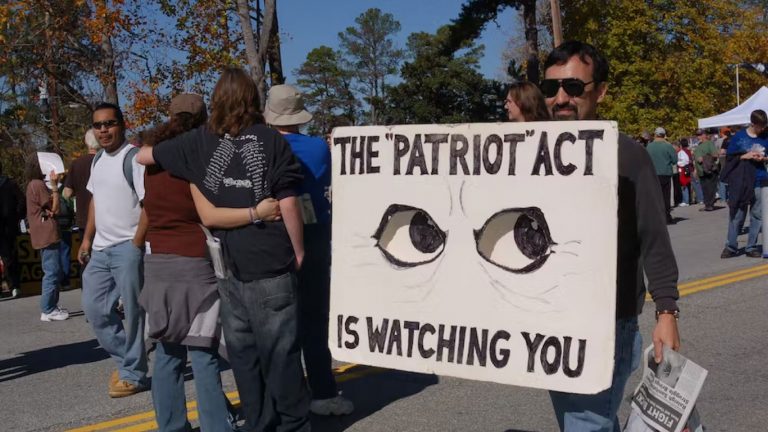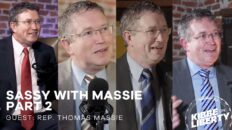Benjamin Franklin famously noted that those who will trade freedom for a little temporary safety deserve neither. That is exactly the calculation that Americans made, however, in the aftermath of the terrorist attacks on September 11, 2001. This week marks the twenty-first anniversary of the passage of the USA Patriot Act, swiftly signed into law in a political environment characterized by national grief, fear, and a desperation to do something, anything.
It’s hard to blame anyone for this attitude. I was old enough in 2001 to remember the profound psychological impact of watching the Twin Towers fall, and I was as anxious as anybody to make sure that it never happened again. But it’s precisely in those moments when we need to be most on guard against political opportunists determined never to let a good crisis go to waste.
The politicians who drafted and voted for the Patriot Act described it as a necessary toolkit to allow the government to identify and prevent terrorist threat both at home and abroad. The Constitution, they argued, with its pesky restraints on government power, its protections of personal privacy, and its insistence on the due process of law, was a hindrance to their ability to do their jobs and protect the American citizens. The founders had no idea what dangers modern technology would present to the Republic some two centuries in the future. And after all, what good are civil liberties if you’re not alive to use them?
It’s impossible not to draw parallels between these attitudes as expressed in 2001 and the wave of panic that swept over the country in 2020, when the coronavirus pandemic reached our shores.
In both cases, people were so anxious for a solution to a palpably frightening problem that all other considerations were swept to one side—although one could argue that there’s a pretty big difference between failing to parse the details of a piece of anti-terrorism legislation and consenting to lock down major portions of the country’s economy for nearly two years.
We now possess the benefit of hindsight in both cases, and one thing that has become increasingly clear is that Ben Franklin had a point. The lingering effects both of the Patriot Act and of COVID lockdowns point to a series of tradeoffs that have very much failed to work out in Americans’ favor. We’re not much safer, but we are considerably less free. Of course, we have no way of knowing whether the enhanced surveillance powers created by the Patriot Act have actually done much to prevent terrorism. It’s true that we haven’t had a second 9/11, and that’s certainly a good thing. But it’s also the case that there have been numerous instances of domestic terrorism since 2001, such that any claim that the Patriot Act made us “safe” is a clear overstatement. It’s possible that we are safer than we otherwise might have been, but this is unprovable and, having witnessed the bumbling efforts of the TSA in action for the last twenty years, something I remain pretty skeptical of.
We’ve also learned from the COVID lockdowns that any promises by government officials to keep us safe are not to be trusted. In 2020, we gave the experts a blank check to protect us from the pandemic, and they failed by every possible metric. Not only did lockdowns fail to stop the virus from spreading, but all the protocols recommended by official health authorities proved to be counterproductive, from staying indoors, to constantly masking up, to putting disinfectant on our groceries, to herding elderly New Yorkers into poorly ventilated nursing homes. If the medical experts in this case proved so corrupt and incompetent, why should we put any more faith in counterterrorism experts? Is there any reason to believe that they are better?
It’s not just that these government measures fail to make us safe. If that were the case, it would be wasteful, but otherwise fairly benign. The reality is far worse. The Patriot Act and similar laws create an active danger in that they empower government to persecute the innocent as well as the guilty, and to exert ever increasing levels of control over the population. One of the Patriot Act’s most dangerous provisions broadens the definition of domestic terrorism to include a wide variety of activities that could be regarded as legitimate forms of protest. The ACLU, which in 2001 was still a pretty reliable defender of civil liberties, pointed out that under the new definition environmentalist groups like Greenpeace could easily be classified as terrorists in the hands of a hostile Justice Department. The danger of weaponizing the definition of terrorism for political purposes is not hypothetical. Just this year, we saw the reality of this threat when the National School Boards Association requested that the Patriot Act be used against concerned parents showing up at PTA meetings to protest the methods and materials foisted upon their children in public schools. If the Patriot Act can force parents to keep their mouths shut about their own children’s education, and can silence protesters against government policies, it’s clear that it is as much a tool to oppress as to protect.
Just ask Edward Snowden, who is now living in exile in Russia after blowing the whistle on the National Security Agency’s egregious spying activities on American citizens. Not only is the Patriot Act being used to allow the secret mass surveillance of innocent people, but it drove the only man brave enough to point this out into hiding lest he spend the rest of his life in prison.
In 2001, the country made a Faustian bargain, giving up our privacy and our expectation of due process for an illusory promise of protection. The ramifications of that decision have only gradually become apparent, but with every passing year it seems more evident that we lost more than we gained. In 2020, we repeated his mistake, though on a far more calamitous scale. The consequences of that deal with the devil will be felt for generations, even in the unlikely event that we limit the damage to what has already occurred.
History is only valuable if we are able to learn from the mistakes of the past and prevent them from recurring in the future. We hear much these days about the need to teach our children the historical injustices of slavery and racial discrimination, so that these errors remain in the past where they belong. As far as it goes, this is good advice. But it is equally important that we continue to talk about how government manipulates the citizens in a crisis, using fear to strip away our most basic rights and offering only empty promises in return. Unless we learn that lesson, and learn it soon, we are only one outbreak, one bombing, one unforeseen disaster away from willing giving away everything that makes America a beacon of freedom and prosperity all over the world.














[…] however, that seems unlikely, as the COVID-19 pandemic brought on a new round of government overreach and set many more dangerous precedents. It seems we […]